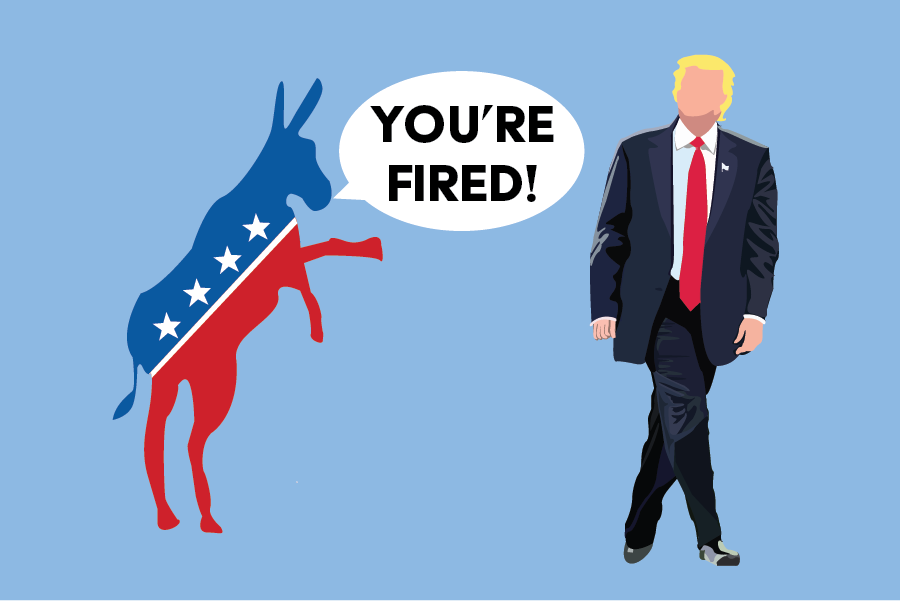
With impeachment currently doomed to fail, Democrats need to look toward finding ways to compromise with Republicans
While the results of the most recent midterm elections proved to be in accordance with election predictions — Democrats won the House and key swing state governorships, and Republicans expanded their Senate majority — the months and years to follow remain unpredictable. Nevertheless, impeachment is on the minds of Democrats.
Exit polls from this month’s elections found that more than three-quarters of self-identified Democratic voters support the impeachment of President Trump. Nancy Pelosi, currently in position to once again be named the Speaker of the House, has eased up on talks of impeachment in favor of perhaps cooperating with the Republicans. However, statements from other Democrats imply that Pelosi’s sentiments aren’t universal among her party.
Representative Jerrold Nadler, a Democrat from New York, told CNN anchor Jake Tapper that Trump’s alleged hush-money payments to women during the 2016 presidential election “may be an impeachable offense if it goes to the question of the president procuring his office through corrupt means.” Nadler is poised to become the chairman of the House Judiciary Committee, customarily responsible for impeachment hearings. In an interview with The Washington Post following the White House’s rescinding of Jim Acosta’s press pass, California Representative Adam B. Schiff suggested that Democrats would investigate Trump’s reprisals against certain media sources as misuses of instruments of power. It’s notable that Schiff is primed to take control of the House Intelligence Committee.
Even if House Democrats successfully move to impeach, the Senate is unlikely to garner the necessary two-thirds vote to deliver a guilty verdict. Historically speaking, the basic conditions of impeachment — being deemed unfit for office — has not once been satisfactory in getting the Senate to remove a president. With Republicans composing a majority of the Senate during a time of rigid polarization, the likelihood of impeachment dwindles further.
Moving to impeach the president, absent of what some would deem “smoking gun” evidence of clear-cut treason against the U.S. in favor of Russia, is likely to fail. This is a condition under which gridlock is guaranteed and, consequently, Americans’ faith in government is plagued with ambivalence. The latter result may prove especially harmful to Democrats — the traditional proponents of active government in the lives of citizens.
The impact of gridlock on Americans’ confidence in government is damaging, to say the least. Adversely, confidence in government is what Democrats need if they expect to win over more voters. Within this context, Republicans have less to lose from a dysfunctional government — if anything, it bolsters their platform by evidencing their qualms that government is fundamentally incompetent and ineffective.
Given how Mitch McConnell declared his intentions to oppose everything President Barack Obama did, with added support from his Republican colleagues, some Democrats might see their majority in the House as means to exacting revenge — a feat that would undermine Democrats in the long term and their agenda almost immediately. This is not to advocate for being the party of compromise, but rather to argue for acting effectively and strategically.
President Trump, setting a historically record-low approval rating during his first year in office in comparison to the preceding seven presidents, may be more willing to cooperate with Democrats. Furthermore, to the benefit of the Democrats, Trump is motivated by self-interest, not any real ideology, as evidenced by his willingness to abandon long-standing Republican party positions ranging from Russia to free trade. Combined, these factors may result in Trump’s inclination to salvage his administration’s legacy before his term is up, and there are two key issue areas in which both parties seem willing to cooperate.
U.S. infrastructure receives a D+ grade, according to the American Society of Civil Engineers’ 2017 Infrastructure Report Card. Studies show that outdated infrastructure hurts economic growth and presents safety risks. Although both parties disagree on matters of funding, both agree that it’s an important issue to tackle. Health care is another key area; both parties want to curb prices but deep divisions, specifically in regards to Obamacare, present a challenge to cooperation — a challenge likely to be further aggravated by impeachment attempts.
This isn’t an advocation of Michelle Obama’s admonition that “when they go low, we go high.” The political environment as it currently stands has established conditions in which attempts to impeach the president is guaranteed to fail. Consequently, gridlock is ensured under the Trump administration.
Democrats should abandon impeachment not just for the sake of what could be achieved through cooperation, but to avoid undermining their own agenda.
Written by: Hanadi Jordan — hajordan@ucdavis.edu
Disclaimer: The views and opinions expressed by individual columnists belong to the columnists alone and do not necessarily indicate the views and opinions held by The California Aggie.



